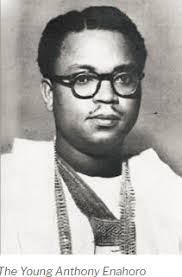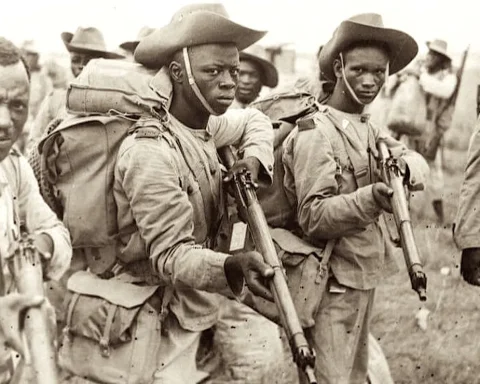The tales of colonial resistance are packed with stories of men who led and represented bravely. We read of leaders like Jaja of opobo, Jomo Kenyatta and the few tales of women like Moremi who fought for the freedom of her people are just being told.
This four series article was written to highlight men and women who fought and resisted colonial rule in their countries.
Today’s spotlight is on Chief Anthony Eromosele Enahoro, one of Nigeria’s most vocal anti-colonial activists.

Born July 22, 1923, Uromi, Eromosele was the eldest of Anastasius and Fidelia’s ten children. He had a sound academic background and went on at the age of 21 to be the editor of Nnamdi Azikiwe’s southern Nigerian Defender. This made him the youngest Nigerian editor ever. He went on to edit for many nationalist newspapers.
However, even as a student in the early 1940s at Kings College, Enahoro participated in various revolts against colonial rule in Nigeria. In 1944, as a student leader in the college, he led the students’ revolts.
He was very outspoken in politics, and it was mainly due to his bravery and outspokenness that Nigeria got her independence. He was jailed thrice by the colonial government, the first time was in 1946 when he published in the Daily Comet an exposé of British colonial misconduct, and he was sentenced to nine months of imprisonment on the grounds of sedition.
In 1947, he got a 12-month sentence for a speech where he called out the discrimination and violence the Nigerian troops experienced in Britain. The British colonial government alleged that the purpose was to invite the Nigerian troops that served in the British army. He was, however, on his third arrest, recognised by the British, who termed him a firebrand.
In 1953, he became the first to move the motion for Nigeria’s independence. This motion was continually set back in parliament on account of the northern members of the parliament staging a walkout in response to it.
This motion started a powerful and popular movement that mounted intense pressure against colonialism or self-governance. This pressure was sustained by numerous people from 1953 till 1959, when the colonial government, as a result of the pressure, announced the British decision to grant Nigeria independence in 1960.
Enahoro’s activism didn’t end there. He was against military rule and continually criticised it. He also had to escape numerous assassination attempts.
He died on December 15, 2010.





